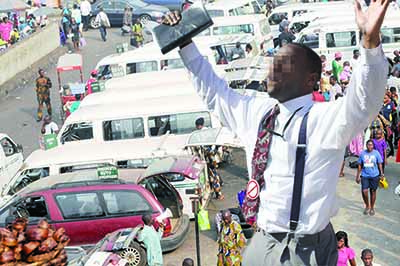For the weary Lagos commuter, the daily bus ride is a gauntlet of sights, sounds, and smells.
Crammed shoulder-to-shoulder, passengers battle traffic and the heat, yearning for a moment of peace. But amidst the chaos, a familiar figure emerges — the itinerant Bible preacher, transforming the crowded bus into a mobile pulpit.
These roaming evangelists board at departure points, paying their fare like everyone else. They strategically position themselves behind the driver, a vantage point for surveying their captive congregation.
Brother Jude is one of them. This morning, he adjusts his worn Bible as he boards the yellow Danfo at Oshodi. He pays his fare, an unwritten agreement for the right to preach. With a practised ease, he settles behind the driver, and a few minutes into the journey, rises with a booming “Hallelujah!” This is followed by a soulful rendition of a praise song. Heads turn, some nodding along, while others offer a resigned tolerance.
Brother Jude’s sermon is a potent cocktail of hope and deliverance. Poverty, a constant threat in the country, is tackled head-on, with promises of financial breakthrough. Witches and unseen forces blamed for misfortune are cast out with a flourish. The preacher’s voice rises and falls, weaving a narrative of struggle and ultimate triumph.
“Lagos can wear you down,” he thunders, “but God promises abundance!” A young woman squeezed into a corner seat claps softly. “Sometimes, it’s all we have to hold onto,” she murmurs.
The sermon reaches its crescendo as Brother Jude lays out the ‘offering basket.’
“The Lord’s work needs your support,” he declares, detailing the need for megaphones and gospel tracts. This is the heart of the transaction. Passengers reach into their pockets, some offering a crumpled note, others politely declining.
The preachers are veterans, some with established ‘territories’ on specific bus routes.
“On a good day,” Brother Jude reveals, “I can get up to N5,000.” This is a significant sum, considering the fare.
However, the life of a mobile evangelist is not all rosy. Newcomers struggle to break in, their sermons lacking the eloquence or, as some would say, the ‘anointing’ of the established preachers. Their meagre offerings barely cover the bus fare.
The practice of preaching on Danfo buses is a source of debate. Ganiyu Akande, a Muslim civil servant, finds it intrusive. “I take the bus to get home, not a lecture. You really get tired of people trying to impose their beliefs on you” he grumbles.
However, Mrs. Idowu, a regular on Brother Jude’s route, disagrees. “His words keep me going,” she says, clutching a worn evangelism tract.
When confronted, Brother Jude cites his right to free speech and, of course, his freedom of worship. Not everybody agrees. “The commuter bus is a confined space where you have no choice but to listen” says Oge Okolie, a hair stylist. “Their sermons are forced on you. I am a Christian, but I resent it,” she complains.
Government buses used to offer a respite from the highway evangelism. Strict regulations forbade any form of preaching or hawking, ensuring a (relatively) peaceful commute. But not any more. The mobile gospel market thrives everywhere, including in government-owned vehicles.
In a city with staggering youth unemployment, the mobile preaching offers a semblance of work. Yet, the debate rages on: are they purveyors of hope or exploiters of the vulnerable?
One thing is certain: the itinerant preachers are an undeniable part of the Lagos experience. They add a layer of vibrancy, a touch of the extraordinary to the everyday life.
Whether a source of comfort or annoyance, the itinerant preachers offer a glimpse into the deep-seated faith and the everyday struggles that define Lagos.
Are they peddlers of hope, or opportunists exploiting the city’s desperation? The answer, like the city itself, is a complex and ever-evolving conversation.


